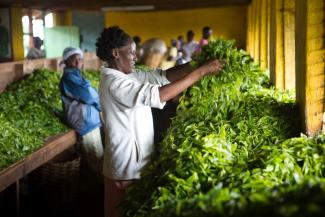Employment
The countryside needs a better image

It is the well-educated young Africans, in particular, that are leaving rural areas for the cities. A job in agriculture simply does not appeal to them. Nana Adjoa Sifa Amponsah, who founded an agricultural incubator in Ghana, is trying to attract them with a linguistic trick: She talks about “agribusiness” in order to convey the potential in this field of employment.
In her eyes, political support is necessary to make agriculture more attractive. For example, the Kenyan government buys products from small farmers in order to supply prisons and public institutions. “People need to see that there are buyers for their products,” said Amponsah at a panel discussion of the German Ministry of Economic Cooperation and Development (BMZ) in Bonn at the end of March.
According to BMZ division leader Gunther Beger, the future of humanity will be decided in the countryside. Most of the world’s hungry live there. Further, half a billion people in Africa will enter the workforce by 2030. His colleague Stefan Schmitz warned: “Throughout the world, rural areas have been neglected for far too long.” These regions now lack streets, electricity, schools, and hospitals. Businesses and well-educated people have therefore shied away from investing in rural areas.
The panelists agreed that farmers need better access to financial services. Getting a loan for consumer goods such as a refrigerator or a television is not a problem. But when it comes to loans for agricultural endeavors, banks are often skeptical.
Support for women is especially important. Halatou Dem from Mali had herself turned her back on her mother’s grain-processing business and went to work at a foundation before realising the necessity of agriculture. Today, she heads up the family business and employs more than 20 permanent women workers. As a young woman, she initially had many problems in being taken seriously by male business partners, says Dem. Those days are behind her now. “In Ghana,” says Amponsah, “many women work in agriculture, but they are at the bottom of the income chain.” She wants to use her company to change this.
Lutz Hartmann, who has managed an agricultural company in Ethiopia for the last three years and is a member of the board of the German-African Business Association, laments bureaucratic red tape. Even the smallest administrative procedures usually need to be taken care of in the capital city of Addis Ababa, which is an eight-hour car ride away. It is also difficult to find qualified office workers in the countryside.
Well-educated people who leave the city for a job in the rural sector are the exception. One of them is Gabriel Litunya Akali from Kenya. Until recently, he worked in the flower-cutting industry in the capital city of Nairobi, but he now works as a consultant for farmers in the countryside. His wife, who is employed in the banking sector, still lives in Nairobi along with their two children, where the living conditions are better. He therefore commutes between city and country – at the family’s expense.
The panel discussion of the BMZ was part of a three-day workshop called “Rural Future Lab,” which served as the kick-off to the G20 conference that will take place in Berlin at the end of April on the topic of “The Future of the Rural World. Innovation – Youth – Employment.” A “Berlin Charter” is expected with the goal of creating employment opportunities for young people in rural areas.












